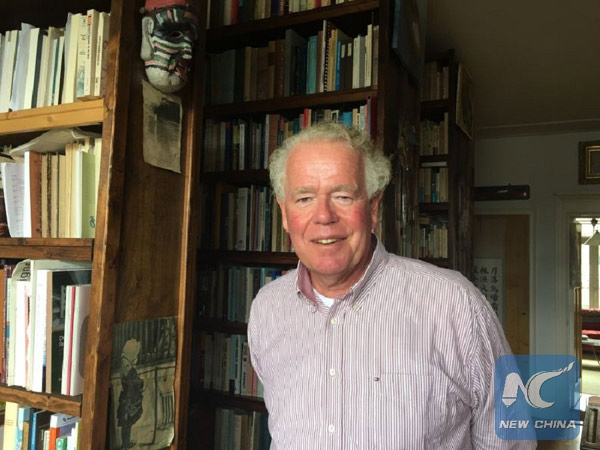Dutch historian tracing forgotten Chinese migrants overseas
Updated: 2016-08-24 09:53
(Xinhua)
|
|||||||||
 |
|
Photo taken on Aug 7, 2016 shows Dutch historian Leonard blusse at his home in Amsterdam, the Netherlands. [Photo/Xinhua] |
AMSTERDAM - Dutch historian Leonard Blusse has won this year's "Special Book Award of China", which honors foreign translators, writers and publishers for their significant achievements in making China better known to the outside world.
The professor emeritus at Leiden University is a prolific writer on the early modern history of Southeast and East Asia, history of overseas Chinese and global history.
Thanks to his digging into the archives of the Dutch East Indian Company (generally abbreviated as "VOC" in Dutch) for dozens of years, more information about the Asian societies and their interactions with other peoples in the 17th and 18th centuries has come to light.
"The history of the Chinese people has for a long time largely been imagined in terms of the gradual territorial expansion of the Han people from the bend of the Yellow River towards the subtropical plains of the South, the steppes in the West, and the high mountains of Tibet," said Blusse.
"Yet, in my point of view, the forgotten heroes of China's history are the sailors, fishermen, traders, miners and other entrepreneurs from China's southeastern coastal provinces who, over the past centuries, went overseas and have sought to build up new livelihoods outside the orbit of the former Chinese imperial government," he added.
In his 1986 work "Strange Company", Blusse focused on the mestizo wives of the Dutch and of the Chinese community in the Dutch colonial city of Batavia, the center of the VOC trading network in Asia.
"I like to dig out data that give us a fuller understanding of -- but also may challenge -- the accepted versions of history," he said.
"I saw one peculiar common feature in these two groups each in their own way made it possible for the personnel of the VOC to succeed in their occupation and life," Blusse said in an interview with Xinhua.
Another of his major publication, "Bitter Bonds" (2002), tells the story of a colonial divorce drama in the 17th century.
Cornelia van Nijenroode, daughter of a Dutch trade station manager in Japan and his Japanese concubine, had become a successful and wealthy merchant, but through an unhappy marriage she lost the right to manage her own property and business to her spouse, who wished to control her finances, which caused a severe conflict.
"What I like to do is dig up or construct enlightening narratives from archival data to throw new light on larger issues that have been misinterpreted or misunderstood by other historians. This life story of Cornelia van Nijenroode, for instance, was written to explain what the legal position of (mestizo) women really was in colonial society through describing a series of law suits and administrative decisions," explained Blusse.
Today's Top News
Turkish forces launch operation in north Syria to fight IS
Several killed after strong quake strikes Italy
UK manufacturing export orders highest in 2 years after Brexit vote
Paris tourism lost 750 mln euros after attacks
EU leaders meet to launch post-Brexit path
France's Sarkozy to run for 2017 presidential election
Turkey vows to cleanse IS from border after attack
Show of unity: Merkel, Hollande, Renzi meet
Hot Topics
Lunar probe , China growth forecasts, Emission rules get tougher, China seen through 'colored lens', International board,
Editor's Picks

|

|

|

|

|

|







